Many bird species make for excellent pets. One of the most popular is the ever-adorable, silly, energetic cockatiel, a small species in the parrot family native to the Australian Outback. These birds tend to be easy to care for, which is one reason they’re so popular, plus they don’t take up nearly as much room as, say, a macaw. Before you invest in a beautiful little feathery friend, though, you’ll want to consider cockatiel costs for setup, the bird itself, monthly upkeep, and maybe even the full lifetime costs.
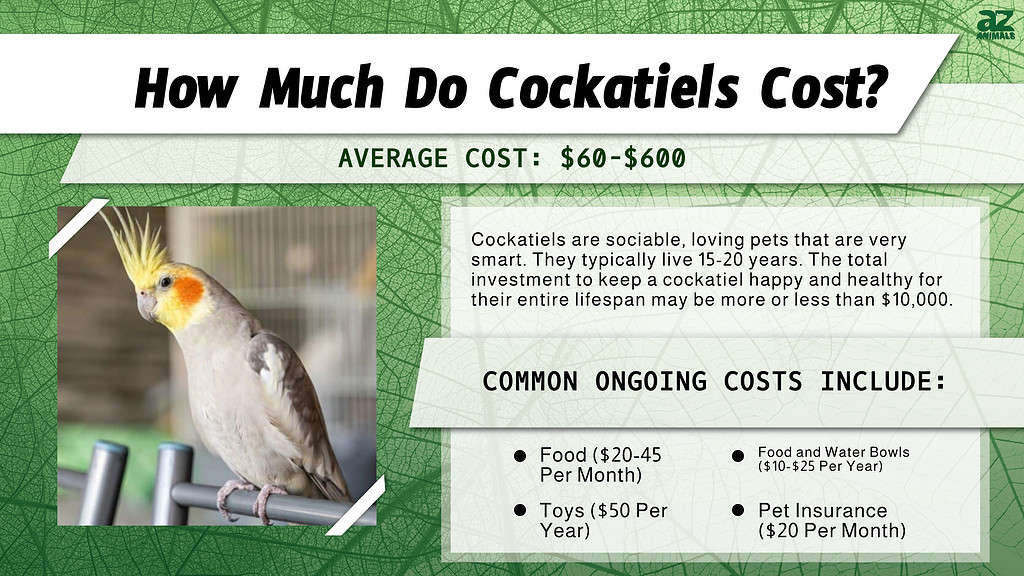
Cockatiels are less expensive to keep than many other pets but they can still be expensive for anyone on a tight budget.
How Much Does a Cockatiel Cost?
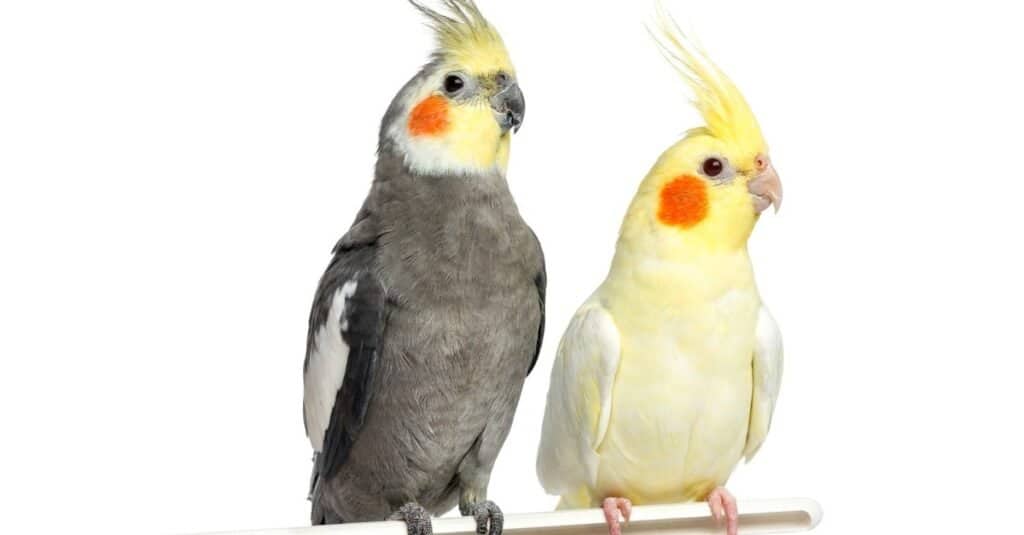
Cockatiels project their emotions and moods using their beautiful head crests. Raised crests may mean the bird is either curious or content. Look for other body language to determine which.
©iStock.com/GlobalP
Several factors decide the cost of a cockatiel. First, the age of the bird will vary the cost greatly, as younger birds are “worth more” than older birds that don’t have as much life left ahead of them. Younger birds are also trainable, while older birds, if badly trained, can be more challenging.
Unless you find a free cockatiel, you’ll likely be looking at a minimum of $60 for the common gray cockatiel and upward to somewhere around $600 for the high end of Albino or white-faced cockatiels.
The health of the bird will also impact the cost, as well as, of course, the coloring or color mutation of the bird.
Cockatiel Cost by (factor) – Lowest to Highest
| Coloring or mutation | Cockatiel Costs |
|---|---|
| Common gray cockatiel | $60 to $80 |
| Cinnamon cockatiel | $75 to $100 |
| Pied cockatiel | $110 to $170 |
| Lutino/Yellow Cockatiel | $200 to $600 |
| Silver cockatiel | $250 to $300 |
| Pearl cockatiel | $300 to $400 |
| White/Albino/White-faced cockatiel | $450 to $600 |
Is it Ever Possible to Get a Free Cockatiel?
While it’s never a guarantee, you could find a cockatiel for free on various websites. This happens when someone needs to rehome their bird for any number of reasons. This could include moving to someplace too far away to comfortably move the bird, getting other pets, discovering allergies, or having new human family members move in. New babies may also cause some to give up their birds, as well. Occasionally, it may be an elderly person passing before the bird does, or some other unforeseen circumstance.
The best places to possibly find a free cockatiel include Freecycle.org, Craigslist, pet rescues and shelters, or Petfinder.
What’s the Best Age for a New Cockatiel?
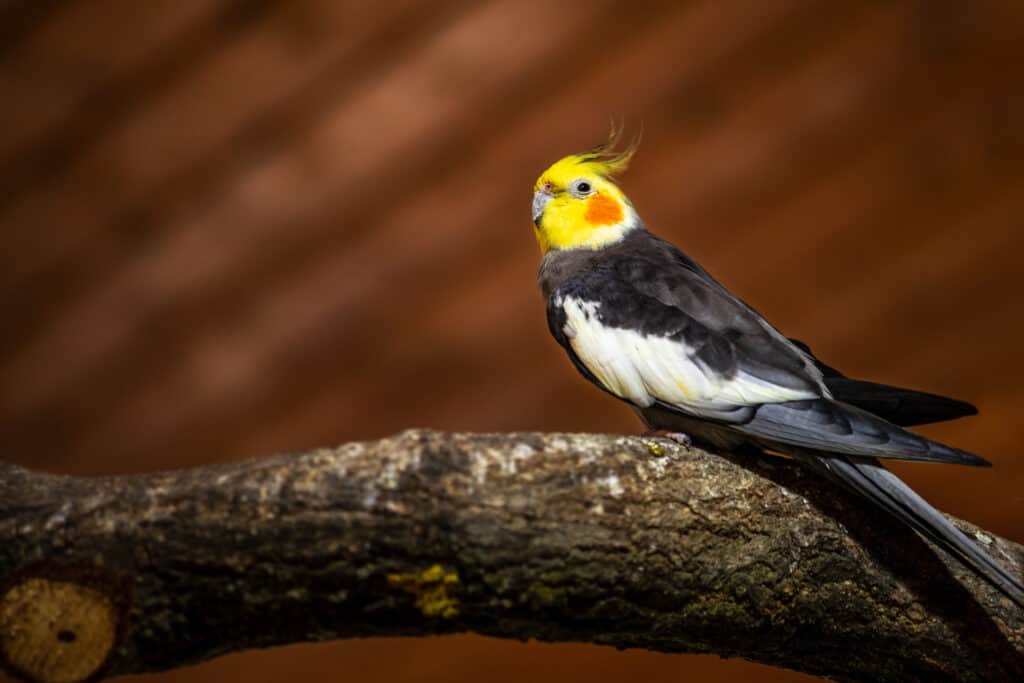
The beautiful birds may be spotted in the wild in Australia. Now, though, they cannot be exported from Australia to the rest of the world, so you’ve got to find a good breeder or rescue in your area.
©iStock.com/Vronja_Photon
Since cockatiels live between 15 and 20 years on average, the age of the bird will impact the price. For those looking to rescue a bird, the age isn’t so much of concern, unless you’re rescuing a young bird.
Ideally, a cockatiel will be weaned fully when you bring them home. If you bring one home before it is fully weaned, it may not survive the move.
Where to Find a Good Cockatiel
The best places to find a cockatiel to bring home include shelters and rescue organizations if you’re looking for an adult or pet stores and breeders for babies.
Be sure to set up your cage, purchase that travel cage, and have enough food and supplies on hand to give you and your feathery friend time to adjust somewhat before you go buy one.
Local shelters won’t always have cockatiels available, but when they do, they usually come at a highly discounted price compared to breeders and pet stores. More importantly, you’ll be rescuing a bird and giving her a new loving home instead of a life in a group facility where they won’t receive as much love and attention as you can give her.
If you really want a young bird, though, look for a reputable breeder or a pet store that has a good reputation for ethical practices. If the pet store you frequent doesn’t have any cockatiels that you love (or in stock when you’re ready to bring one home), ask for contact for breeders. They typically know a few and don’t mind sharing the info. You can also hit up Facebook groups and other social media to ask for reputable breeders in your area.
Tips for Choosing Your Cockatiel
- While licensing isn’t typically an issue for cockatiels as pets, it is best to look for breeders who are members of respectable bird associations and have good reviews and reputations. You don’t want to support harmful breeding practices or purchase a bird that could be sickly.
- If you notice the bird you’re interested in isn’t a particularly rare color mutation but has a huge price tag, walk away. This likely involves a scam.
- Particularly low prices also indicate some unsavory practices, whether the bird is ill or there’s something going on. Avoid birds that seem to good to be true.
- When you meet the birds, check for healthy plumage as well as colors you like. The coloration will change somewhat as they mature into adulthood, but otherwise, colors remain the same.
- Playful birds at the breeder or shelter will be playful birds at home. These are healthy, happy birds. They should also be willing to let you handle them. If they’re not up for that, they will likely be challenging to care for.
- Cockatiels should have clear eyes and clean beaks, undamaged feathers, and should seem comfortable around people. They’re energetic, social birds, so lethargy and anti-social behavior are poor indicators of a good life together.
- Check the age of the bird and make sure it is weaned. The darker the beak, the older the bird. If it’s pale, the bird may not yet be properly weaned.
Once you bring your new pal home, give them a few days to adjust before you try to handle him. He needs some time to settle in, just like you do when you move.
What’s the Best Time to Buy a Cockatiel?
Where you live will largely impact the price of your potential cockatiel. For example, folks living in Australia will find less expensive birds because this is their native home and so no international shipping, exchanges, and other factors come into play.
Around Christmastime, no matter where in the world you live, you’ll likely notice a price hike, as well, so you may want to avoid purchasing a new cockatiel then. If you plan to give the bird as a gift, you could consider giving a “voucher” to your recipient for a later purchase (maybe mid-January?) if you need to save some cash.
You’ll likely find price drops for your favorite breeder after a large brood has been born.
Basic Supply and Equipment List for Cockatiels
- Food
- Toys
- Food & water bowls
- Travel cage
- Bedding
- Cleaning supplies
- Cage
- Backup or travel cage
- Training equipment
- Medical insurance
Cost for Food

Healthy birds eat between 30 and 40 grams of food every day. Seeds, fresh fruit, pellets all combine to create their diet as pets, and usually runs between $20 to $45 a month for each bird.
Cost for Toys
Some animals don’t need to be kept busy and play with toys. Cockatiels are not one of those species. They need nearly constant mental stimulation to keep them healthy, happy, and out of trouble. Purchase a rotation of toys to keep them interested, engaged, and interacting.
Initially, you’ll likely invest in around $50 worth of toys. If possible, keep that budget up annually to keep them happy and engaged. If you just can’t afford that, keep the rotation as interesting as possible with some of the older toys coming back for a visit.
Food & Water Bowls
You’ll need to purchase water and food bowls before you bring home your cockatiel, but you’ll also potentially need to replace them about every year. Each set usually runs between $10 and $25.
Cost for Bedding and Cleaning Supplies
Cockatiels require a clean, hygienic environment for a healthy life. That means that you’ll need to keep the bedding clean and fresh and use proper, safe antibacterial cleaners for their space. Most folks spend between $10 and $20 a month every two to three months.
Cage and Backup Cage Cost
One cockatiel needs a cage that measures at least 24 by 24 by 24 inches. This gives the bird plenty of space for an active, happy life. These cages typically start at $70 for the basic model and go upward, depending on how fancy you want to go.
Cockatiels are particularly skilled at escape, as well, so you’ll need a quality, sturdy metal cage that allows you to lock it properly to keep them in. Additionally, look for a cage that has bars no more than 5/8 inches between them, thick wires, and non-toxic paint coat.
For your backup or travel cage, you can go with slightly lower quality options, which often run about $50.
Cost of Perches
Like most birds, cockatiels need some good places to perch. That means you’ll want to invest in a few of these for your pet’s cage. This helps keep them strong and healthy, happy and fun. Place the perches at varied heights throughout to keep them engaged.
Most perches range in price from $15 to $30.
Training Equipment
For properly socialized cockatiels, some training is involved. This means a few one-off investments in equipment to help them adapt and learn.
You’ll need a training stand (T-shaped) for use at tables, one for floors, a shower perch, and some folks also recommend a play basket. These together will probably run you about $40 to $50. You won’t need to repurchase this equipment.
What’s the Cost for Insurance and Health Care for Cockatiels?
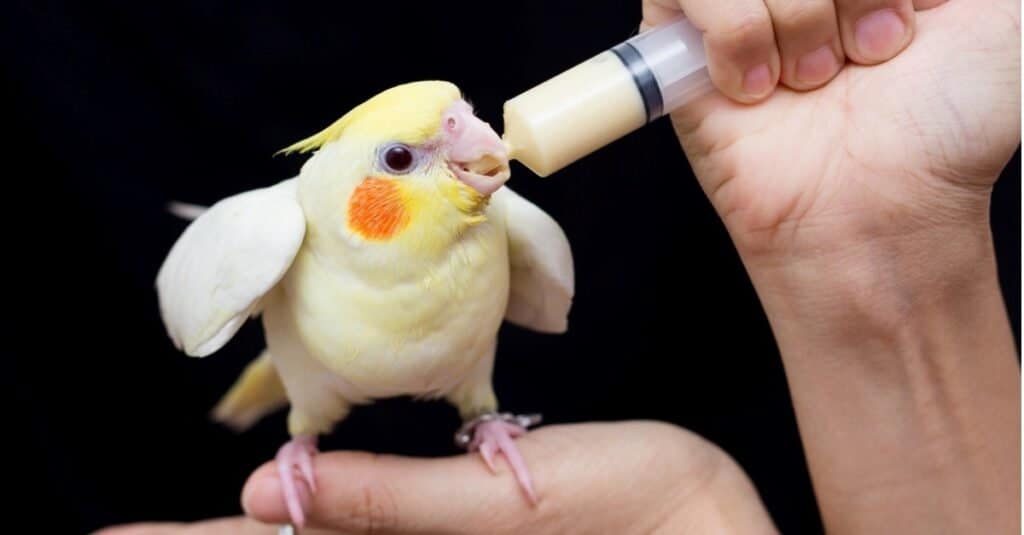
Sometimes, cockatiels may need to be hand fed when young or ill.
©iStock.com/tatchai
While the hope is to never bring your little pal to the vet (save for those annual checkups and vaccinations), it’s a good idea to invest in health insurance for them. A single test can cost $50 or more, even for something simple. Insurance helps cover the costs for unexpected visits and, in some cases, may cover the annual visits, as well.
Most pet insurance for cockatiels will run you about $20 a month, depending on the coverage plan you choose.
Total Lifetime Costs of Owning A Cockatiel
When you look at the full lifespan of a cockatiel, you can estimate how much keeping them will cost you over time. This may help you determine if you need to increase your pet care budget.
A good budget for any pet includes the initial cost, annual care and upkeep of their equipment, and having some money socked away for emergencies and incidental costs.
If you bring home a baby cockatiel, you could well have this darling pet for 15 to 20 years (the average lifespan).
- Bird: $60 to $600 (depending on color mutation)
- Fixed costs (i.e., set up like cages) will typically run around $170 to $250.
- Annual costs: $500 to $650 (total lifetime = $7,500 to $13,000)
- Incidentals: $1,000 to $1,500
So, in total, if you have a cockatiel for 15 years, the entire cost will run you between $8,730 and $15,350.
This may seem high, but if you consider the cost differences between keeping a cockatiel for 15 years versus a large dog (estimated at $20,000 to $55,000) or a cat ($15,00 to $45,000), it’s really not.
Helpful and Fun Facts About Cockatiels
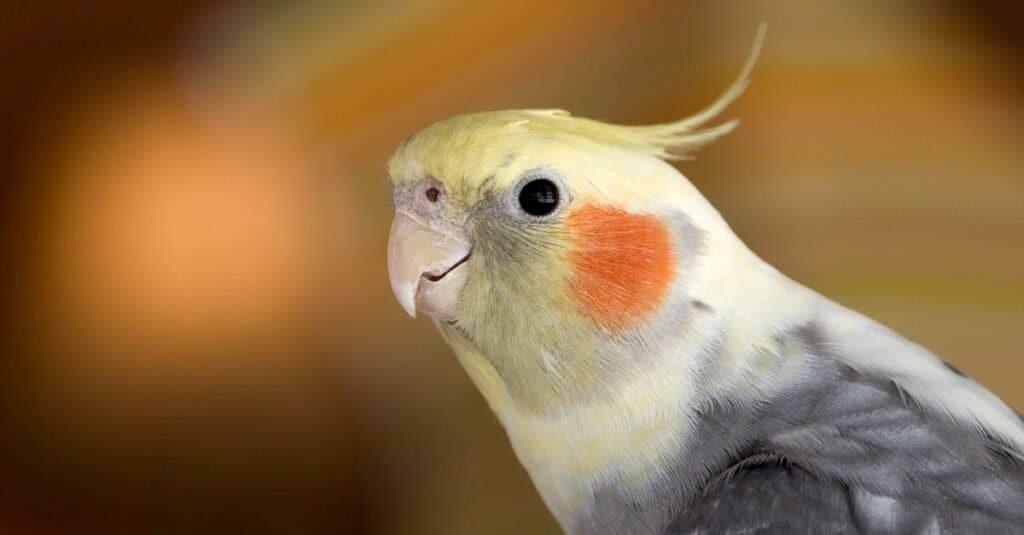
Cockatiels are sweet, curious, and entertaining.
©iStock.com/nicepixel
- Some cockatiels can talk! But not all. Some may chirp, warble, or whistle instead.
- Male cockatiels are better whistlers than females. This is largely due to the fact that the males use whistling as a mating call, trying to attract females.
- Cockatiels were first “discovered” in 1770 when settlers and explorers moved into Australia. The birds natively live in the Australian Outback, so it took a little longer to “find” them than other species that live along the coast.
- Males help females take care of their young. In fact, they share the responsibilities equally, but many have observed males being more affectionate and nurturing than females in some cases.
- One of the best toys you can give your cockatiel is a mirror. These little feathery creatures enjoy living with other cockatiels, so if you can’t have two, a mirror is the next best thing (apart from loads of your attention).
- Airborne toxins are particularly bad for these birds. Anything from aromatherapy oils to aftershave can impact their health – so be sure to keep these away from your feathered pal.
- We love our cockatiels and they love us, but that doesn’t mean they won’t bite. This will usually happen when they feel threatened and need to defend themselves (or think they do).
- Beaking, on the other hand, is simply their way of gripping and balancing as they move about without flying. Beaking and licking can help them decide where to settle.
- You can read your cockatiel’s mood by the head crest. Crests held erect show curiosity and contentment. Anger shows up as flattening the crest to its head (along with lunging or swinging upside down). A “resting crest” means your little pal is tired and needs the cover on the cage. A bushy crest (along with singing and whistling) means your friend is happy.
The photo featured at the top of this post is © iStock.com/PaulGulea
Thank you for reading! Have some feedback for us? Contact the AZ Animals editorial team.







